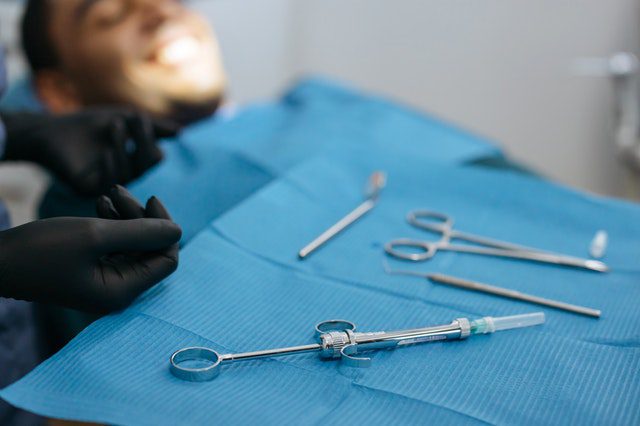Fear of the dentist (or oral surgeon!) is a real thing, and it’s common – you’re not alone in that apprehension you feel before someone sticks a drill in your mouth. If you tense up at the thought of a simple teeth cleaning, let alone something more major like wisdom teeth extraction, you’ve got plenty of company. In fact, a recent study suggested 1 out of every 4 adults experiences significant dental anxiety, and that among phobias, dental phobia is the most common. While they often are lumped into either or as a catchall term, dental phobia and dental anxiety are actually two different things.
Unfortunately, dental anxiety vs phobias aren’t very well understood, and that can contribute to even more fear. So, let’s uncover the mysteries of dental fear and how you (and we!) can help you stay calm in the chair no matter the oral surgery. As some of the best-reviewed oral surgeons in the area when it comes to patient care, your comfort is important to us, and learning more about dental anxiety and dental phobia can be the first step towards healing and understanding yourself better.
Dental Anxiety
Dental anxiety is when there is stress, apprehension and fear around being in a dental office. It usually includes being anxious about the setting as well as what’s involved in the procedure you’re having done, like needles and drills. People with dental anxiety have often had a bad experience in the past. It could have been a dental visit that came with a particular amount of pain. Or maybe when you were a kid, you had a visit with an oral surgeon who specializes in seeing children that ended in more pain than you were anticipating. Those experiences can mold our minds and set precedents that justify the intense feelings of anxiety surrounding dental work.
Symptoms of dental anxiety include apprehension about scheduling and attending appointments, trouble sleeping the night before an appointment, nervousness, and sweating. When you actually go in to see your oral healthcare provider, you might feel tense, on-edge, or a general sense of dread surrounding the appointment. They’re kind of the classic hallmarks of anxiety. People with dental anxiety often realize the fear isn’t rational, which makes dealing with it easier than its more severe counterpart, dental phobia.
Dental anxieties are also learned behaviors in some instances. If, say, you had a parent when you were a child who had a not-so-great experience with a dentist or an oral health surgeon, that apprehension can actually be learned from parental figures. Or if maybe you happened to be in the room watching while your parent was getting a tooth replacement and experiencing some level of discomfort, the anxiety could have been picked up even though it wasn’t directly affecting you.
Dental Phobia
Dental phobia is the next step above dental anxiety. Dental phobia is classified where fear of the dentist becomes so overwhelming it stops people from seeking care, and causes extreme symptoms like insomnia, panic attacks, nausea/vomiting, and even irrational behavior while at the office. Like with anxiety, the patients generally recognize their intense fear as irrational. But they’re unable to control it effectively without intervention.
These are patients who benefit immensely from dental intravenous sedatives when coming in for a major operation like seeing a wisdom teeth removal surgeon. The fear is typically so intense that it proves hard to operate on someone exhibiting symptoms of dental phobia. The oral surgery sedation also allows the patient to completely skip over the most traumatizing part, having zero recollection of the procedure when they wake up.
While people with dental phobias also often realize the fear is irrational, the severity of the phobia, which is often the result of dental trauma earlier in life, means that therapy is usually required in order to overcome the fear.
Why Are People So Scared of the Dentist?
So, why are we so scared of seeing dental specialists? One survey spoke to 18000 people worldwide about dental fear, anxiety and phobia and found:
- 61% of adults reported experiencing dental fear
- 4% have never been to a dentist because of dental fear
- 39% are afraid of the pain
- 24% dislike the smell of chemicals
- 21% are triggered by the sound of the drill
- 7% are afraid of being stuck in the dental chair
- 5% are nervous about keeping their mouth open for a long time
- 5% are afraid of the cost of dental procedures
- 5% generally hate everything about being at the dentist
With so many people reporting a fear of visiting with their mouth surgeon and general dentist, it’s a wonder there are even any patients. Over a third of people are afraid of the pain associated with dentistry, but with modern innovations, operations like painless wisdom tooth removal and relatively pain-free dental implants are a thing.
Caring and compassionate oral surgeons and dentists are all around you eager to change the narrative surrounding dental fear with good experiences and plenty of smiles. Chances are, they’ll fully understand and accommodate if a patient has a conversation with them surrounding their dental anxiety or phobias.
How to Manage Your Fear of the Dentist
Most often, dental anxiety and phobia are a learned behavior. For instance, people can carry traumas around from things like:
- A parent with dental anxiety
- Knowing someone who had a terrible experience with a dental specialist
- Having had a terrible dental experience earlier in life
- Suffering previous facial trauma and reconstruction
For people suffering from generalized dental anxiety, exposure therapy with a trusted dental doctor who provides consistently good experiences can start to shift their perspective. Any sort of oral surgeon who cares about their patients will also be willing to sit down and discuss treatment options if a patient comes to them wanting to talk about dental anxiety. There are tons of things that dentists can do to make someone experiencing heightened anxiety feel more at ease.
There are other things that make people more susceptible to dental phobia, like:
- Children, especially non-verbal
- People with mental health conditions
- People who mistrust medical professionals
- People on the autism spectrum
The good news is, there are ways you can help yourself manage your fear of the chair. These include:
- Cognitive-behavioral therapy to rewire responses to dental fear
- Deep breathing/meditation before and during the appointment
- Distractions like music, video, games, etc
- Using a weighted blanket when in the chair
- Establishing a safe word with your dentist
Remember: your dentist wants you to have a good experience. If you’re feeling a surge of anxiety about an upcoming tooth replacement surgery or other mouth operation, discuss a plan with your local oral surgeon. Breathwork is also an effective tactic at managing intense anxiety and calming your nervous system down.
How Wilmington Oral Surgery Helps Patients Stay Calm
Anesthetics and sedation for oral surgery are two big keys to keeping patients calm and comfortable. That huge survey that looked at dental fear also looked at how people felt about anesthesia and sedation as a solution. They found:
- 60% of people want local anesthetics even though 45% said they found local anesthesia harmful.
- 80% of people said they would consider forgoing local anesthesia to reduce the cost of their dental procedure.
- 43% of people said they’d go into a lengthy oral surgery without sedation, and 2% said they would consider it as long as they had the option in case of severe pain.
Clearly, it seems like there’s some confliction around anesthetics. Affordable wisdom teeth removal and quality dental implants that don’t break the bank are kind of the name of our game, so we fully understand the apprehension towards the cost associated with anesthetics. But they really do help, especially when the patient is experiencing intense levels of anxiety or fear. Sedatives are a saving grace for folks who can’t bear to be under the drill for a surgery or operation.
How does Wilmington Oral Surgery help? We listen to what patients are saying! Our office offers all levels of sedation for surgical procedures, and our oral surgeon is experienced and certified to administer all form of anesthesia. Your course of treatment will be coordinated with you so you get the calm, comfortable experience you deserve with your safety and health as the utmost mitigating factors. We’re consistently reviewed as one of the top oral surgeons in the area for a number of reasons, including how we take care of our patients. We want everyone to have an equally comfortable experience, and we’re willing to work with our patients to come up with care plans as unique as them. If you’re experiencing bouts of anxiety and intense fear, talk with us. We’ll enact a plan to help keep you as comfortable as can be.
As for the cost of oral surgery, we understand that anesthesia is a significant part of the cost of any surgery. But our office has found a way to make surgeries more affordable with a different approach to how we bill anesthesia. Industry standard bills anesthesia in increments, meaning you might pay for 60 minutes even though you only needed 47. Our office only bills for the amount used, which results in significant savings for many of our patients. We believe everyone should have access to affordable oral surgery, and that’s why we work on your side while billing your insurance companies. We also offer plenty of payment options for our services.
In addition, our staff prides themselves on being friendly, calming presences with gentle hands and a compassionate attitude. Whether your toddler’s nervous about their first exam or your grandparent needs a couple dental implants installed but is afraid of the process, we can help.








